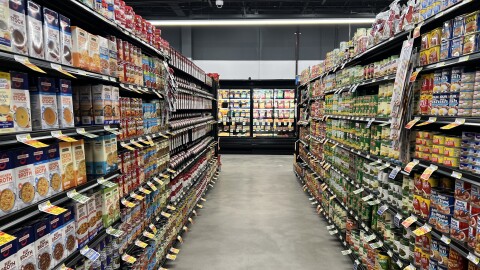The Mid-Ohio Food Collective in the last week has seen demand at local food pantries surge as SNAP benefits are delayed and only partially funded during the ongoing government shutdown.
NNEMAP Food Pantry on 11th Avenue near the Ohio State Fairgrounds had its busiest day ever on Tuesday since it first opened in the 1950s. Executive Director Roy Clark said they've served up to 285 people a day at times, which is starting to impact its supply.
"There's been days which are almost unheard of here that we ran out totally of vegetables, you know, and that's just almost unheard of because we do try to supplement with a local distributor as well," Clark said.
Also impacting supply is previous cuts made to MOFC by Ohio lawmakers, totaling $3 million over the next two years. Clark said for a local pantry like then, that means less pallets of vegetables are coming into the pantry.
"We went from 13 pallets produced a week to 10. So that's three full pallets of fruits and vegetables. So that hit right off the bat," Clark said.
MOFC services 600 food pantries like NNEMAP across a 20-county region in central Ohio.
Spokesman Mike Hochron said MOFC has been focusing on high-cost food items that would be difficult for families to get without SNAP benefits. This includes eggs, milk, protein and fresh produce.
Hochrom said people are responding and donating to both MOFC and directly to pantries. He urged people to continue to donate to MOFC, but said donating to a local pantry can have a more immediate impact.
"Which is really helpful because that's immediate, right. It takes us a few days. To source food, get it and get it distributed. If you have food that you can bring to your local pantry, they can get it out to neighbors same day," Hochron said.
All of this is happening as the government shutdown keeps the SNAP program in a state of limbo. A federal court sided with several plaintiffs, including the city of Columbus, ordering President Donald Trump's administration to Judges order the Trump admin to pay for SNAP benefits following lawsuit by Columbus, other cities with contingency funds.
But the Trump Administration plans to appeal.
Since the shutdown began, there has been constant warnings about SNAP benefits lapsing and the uncertainty of when federal funds could start flowing.
Hochron called it a "rollercoaster ride" and said it is confusing to customers and even officials at MOFC.
"We simply don't know when benefits might arrive or how much people might receive. What we know is none of them are currently getting November benefits," Hochron said.
He said this impacts 1.4 million Ohioans, 170,000 of which are in Franklin County alone.
Hochron said he is thankful that the community is responding. Donations to MOFC are flowing in and so are more local efforts like donations directly to pantries and neighborhood little pantries and blessing boxes.
Hochron said the state of Ohio and local governments like Franklin County and the city of Columbus stepping up does help, but it pales in comparison to the vast amount of federal funding needed to fund the SNAP program for just a month. That's about $55 million.
"So, the governor (Mike DeWine), the state has announced some funding for food banks. Columbus and Franklin County have announced funding. Those together are less than 5%. What we're gonna receive is less than 5% of a single month's benefits for the families in our region," Hochron said.
Hochron said what is happening is not fair to families in the region. He said MOFC encourages people to ask for help and the organization will do its best to serve people.
Hochron said with all of the demand, people also need to be patient.
"We also want to be realistic that we're going to expect longer lines. And a real stretch on the food that's available for each person's cart in the coming weeks. So we encourage people to be patient with pantry staff, patient with lines," Hochron said.




